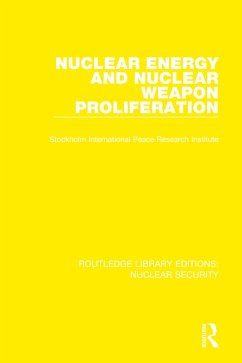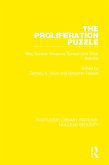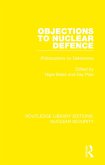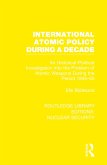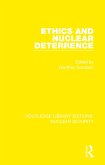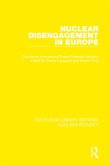Stockholm International Peace Research Institute
Nuclear Energy and Nuclear Weapon Proliferation (eBook, ePUB)
35,95 €
35,95 €
inkl. MwSt.
Sofort per Download lieferbar

18 °P sammeln
35,95 €
Als Download kaufen

35,95 €
inkl. MwSt.
Sofort per Download lieferbar

18 °P sammeln
Jetzt verschenken
Alle Infos zum eBook verschenken
35,95 €
inkl. MwSt.
Sofort per Download lieferbar
Alle Infos zum eBook verschenken

18 °P sammeln
Stockholm International Peace Research Institute
Nuclear Energy and Nuclear Weapon Proliferation (eBook, ePUB)
- Format: ePub
- Merkliste
- Auf die Merkliste
- Bewerten Bewerten
- Teilen
- Produkt teilen
- Produkterinnerung
- Produkterinnerung

Bitte loggen Sie sich zunächst in Ihr Kundenkonto ein oder registrieren Sie sich bei
bücher.de, um das eBook-Abo tolino select nutzen zu können.
Hier können Sie sich einloggen
Hier können Sie sich einloggen
Sie sind bereits eingeloggt. Klicken Sie auf 2. tolino select Abo, um fortzufahren.

Bitte loggen Sie sich zunächst in Ihr Kundenkonto ein oder registrieren Sie sich bei bücher.de, um das eBook-Abo tolino select nutzen zu können.
In mid-1980 a second conference for the review of the Non-Proliferation Treaty (NPT) would take place in Geneva. Originally published in 1979, this book on nuclear energy and nuclear weapon proliferation contains the papers presented at the symposium and reflects the discussions at the meeting.
- Geräte: eReader
- ohne Kopierschutz
- eBook Hilfe
- Größe: 6.17MB
Andere Kunden interessierten sich auch für
![The Proliferation Puzzle (eBook, ePUB) The Proliferation Puzzle (eBook, ePUB)]() The Proliferation Puzzle (eBook, ePUB)35,95 €
The Proliferation Puzzle (eBook, ePUB)35,95 €![Objections to Nuclear Defence (eBook, ePUB) Objections to Nuclear Defence (eBook, ePUB)]() Objections to Nuclear Defence (eBook, ePUB)33,95 €
Objections to Nuclear Defence (eBook, ePUB)33,95 €![International Atomic Policy During a Decade (eBook, ePUB) International Atomic Policy During a Decade (eBook, ePUB)]() Elis BiörklundInternational Atomic Policy During a Decade (eBook, ePUB)33,95 €
Elis BiörklundInternational Atomic Policy During a Decade (eBook, ePUB)33,95 €![Non-Proliferation (eBook, ePUB) Non-Proliferation (eBook, ePUB)]() Stockholm International Peace Research InstituteNon-Proliferation (eBook, ePUB)35,95 €
Stockholm International Peace Research InstituteNon-Proliferation (eBook, ePUB)35,95 €![Postures for Non-Proliferation (eBook, ePUB) Postures for Non-Proliferation (eBook, ePUB)]() Stockholm International Peace Research InstitutePostures for Non-Proliferation (eBook, ePUB)33,95 €
Stockholm International Peace Research InstitutePostures for Non-Proliferation (eBook, ePUB)33,95 €![Ethics and Nuclear Deterrence (eBook, ePUB) Ethics and Nuclear Deterrence (eBook, ePUB)]() Ethics and Nuclear Deterrence (eBook, ePUB)33,95 €
Ethics and Nuclear Deterrence (eBook, ePUB)33,95 €![Nuclear Disengagement in Europe (eBook, ePUB) Nuclear Disengagement in Europe (eBook, ePUB)]() Stockholm International Peace Research InstituteNuclear Disengagement in Europe (eBook, ePUB)33,95 €
Stockholm International Peace Research InstituteNuclear Disengagement in Europe (eBook, ePUB)33,95 €-
-
-
In mid-1980 a second conference for the review of the Non-Proliferation Treaty (NPT) would take place in Geneva. Originally published in 1979, this book on nuclear energy and nuclear weapon proliferation contains the papers presented at the symposium and reflects the discussions at the meeting.
Dieser Download kann aus rechtlichen Gründen nur mit Rechnungsadresse in A, B, BG, CY, CZ, D, DK, EW, E, FIN, F, GR, HR, H, IRL, I, LT, L, LR, M, NL, PL, P, R, S, SLO, SK ausgeliefert werden.
Produktdetails
- Produktdetails
- Verlag: Taylor & Francis
- Seitenzahl: 492
- Erscheinungstermin: 19. November 2020
- Englisch
- ISBN-13: 9781000199543
- Artikelnr.: 60356369
- Verlag: Taylor & Francis
- Seitenzahl: 492
- Erscheinungstermin: 19. November 2020
- Englisch
- ISBN-13: 9781000199543
- Artikelnr.: 60356369
- Herstellerkennzeichnung Die Herstellerinformationen sind derzeit nicht verfügbar.
Stockholm International Peace Research Institute
SIPRI is an independent international institute dedicated to research into conflict, armaments, arms control and disarmament. Established in 1966, SIPRI provides data, analysis and recommendations, based on open sources, to policymakers, researchers, media and the interested public. Based in Stockholm, SIPRI is regularly ranked among the most respected think tanks worldwide.
SIPRI is an independent international institute dedicated to research into conflict, armaments, arms control and disarmament. Established in 1966, SIPRI provides data, analysis and recommendations, based on open sources, to policymakers, researchers, media and the interested public. Based in Stockholm, SIPRI is regularly ranked among the most respected think tanks worldwide.
Preface. Part 1: Introduction B. Jasani Chapter 1. Fuel Cycles 1. An
Evolutionary Strategy for Nuclear Power F. von Hippel, H. A. Feiveson and
R. H. Williams. Appendix 1. Assumptions used in the Economic Calculations
Chapter 2. Enrichment 2. Practical Suggestions for the Improvement of
Proliferation Resistance within the Enriched Uranium Fuel Cycle J. H.
Coates and B. Barré 3. Jet Nozzle and Vortex Tube Enrichment Technologies
P. Boskma 4. Laser Separation Isotopes K. L. Kompa Chapter 3. Reprocessing
5. Proliferation Risks Associated with Different Back-End Fuel Cycles for
Light Water Reactors K. Hannerz and F. Segerberg Chapter 4. Waste Disposal
6. Reprocessing and Waste Management D. Abrahamson Chapter 5. Physical
Barriers to Proliferation 7. Can Plutonium Be Made Weapon-Proof? B. T. Feld
Part 2: Introduction B. Jasani Chapter 6. Breeders 8. The Proliferation
Aspects of Breeder Deployment B. Barré 9. The Role of the Breeder Reactor
R. Garwin Chapter 7. Hybrid Reactors 10. Fusion-Fission Hybrid Reactors V.
Kuhleshov 11. Laser Fusion and Fusion Hybrid Breeders: Proliferation
Implications D. Westervelt and R. Pollock Part 3: Introduction J. Goldblat
Chapter 8. Safeguards Technology 12. IAEA Safeguards Technology A. von
Baeckmann 13. Safeguards Techniques W. A. Higinbotham Chapter 9. Exporting
Policies 14. Applications of US Non-Proliferation Legislation for Technical
Aspects of the Control of Fissionable Materials in Non-Military
Applications W. H. Donnelly Appendixes 14A-P. 15. Nuclear Exporting
Policies B. Sanders Chapter 10. Multinational and International Controls
16. A Nuclear Fuel Supply Cooperative: A Way Out of the Non-Proliferation
Débacle A. R. W. Wilson 17. A Preliminary Evaluation of the Technical
Aspects of INFCE U. Farinelli 18. Nuclear Proliferation: Arrangements for
International Control J. Rotblat Part 4: Introduction B. Jasani Chapter 11.
Peaceful Nuclear Explosions 19. Peaceful Applications of Nuclear Explosions
D. Davies 20. Technical Aspects of Peaceful Nuclear Explosions Relevant to
their Possible Role in the Future Proliferation of Weapon-Usable Nuclear
Materials A. R. W. Wilson Chapter 12. Reactors in Satellites 21. Nuclear
Reactors in Satellites D. Paul Part 5. Chapter 13. Implementation of the
Non-Proliferation Treaty J. Goldblat Appendix A. Treaty on the
Non-Proliferation of Nuclear Weapons. Appendix B. Final Declaration of the
Review Conference of the Parties to the Treaty on the Non-Proliferation of
Nuclear Weapons, 30 May 1975. Appendix C. List of States which have Signed,
Ratified, Acceded or Succeeded to the Treaty on the Non-Proliferation of
Nuclear Weapons (NPT) as of March 1979 Chapter 14. Nuclear Energy and
Nuclear Weapon Proliferation J. Rotblat. Abstracts. Glossary. Index.
Evolutionary Strategy for Nuclear Power F. von Hippel, H. A. Feiveson and
R. H. Williams. Appendix 1. Assumptions used in the Economic Calculations
Chapter 2. Enrichment 2. Practical Suggestions for the Improvement of
Proliferation Resistance within the Enriched Uranium Fuel Cycle J. H.
Coates and B. Barré 3. Jet Nozzle and Vortex Tube Enrichment Technologies
P. Boskma 4. Laser Separation Isotopes K. L. Kompa Chapter 3. Reprocessing
5. Proliferation Risks Associated with Different Back-End Fuel Cycles for
Light Water Reactors K. Hannerz and F. Segerberg Chapter 4. Waste Disposal
6. Reprocessing and Waste Management D. Abrahamson Chapter 5. Physical
Barriers to Proliferation 7. Can Plutonium Be Made Weapon-Proof? B. T. Feld
Part 2: Introduction B. Jasani Chapter 6. Breeders 8. The Proliferation
Aspects of Breeder Deployment B. Barré 9. The Role of the Breeder Reactor
R. Garwin Chapter 7. Hybrid Reactors 10. Fusion-Fission Hybrid Reactors V.
Kuhleshov 11. Laser Fusion and Fusion Hybrid Breeders: Proliferation
Implications D. Westervelt and R. Pollock Part 3: Introduction J. Goldblat
Chapter 8. Safeguards Technology 12. IAEA Safeguards Technology A. von
Baeckmann 13. Safeguards Techniques W. A. Higinbotham Chapter 9. Exporting
Policies 14. Applications of US Non-Proliferation Legislation for Technical
Aspects of the Control of Fissionable Materials in Non-Military
Applications W. H. Donnelly Appendixes 14A-P. 15. Nuclear Exporting
Policies B. Sanders Chapter 10. Multinational and International Controls
16. A Nuclear Fuel Supply Cooperative: A Way Out of the Non-Proliferation
Débacle A. R. W. Wilson 17. A Preliminary Evaluation of the Technical
Aspects of INFCE U. Farinelli 18. Nuclear Proliferation: Arrangements for
International Control J. Rotblat Part 4: Introduction B. Jasani Chapter 11.
Peaceful Nuclear Explosions 19. Peaceful Applications of Nuclear Explosions
D. Davies 20. Technical Aspects of Peaceful Nuclear Explosions Relevant to
their Possible Role in the Future Proliferation of Weapon-Usable Nuclear
Materials A. R. W. Wilson Chapter 12. Reactors in Satellites 21. Nuclear
Reactors in Satellites D. Paul Part 5. Chapter 13. Implementation of the
Non-Proliferation Treaty J. Goldblat Appendix A. Treaty on the
Non-Proliferation of Nuclear Weapons. Appendix B. Final Declaration of the
Review Conference of the Parties to the Treaty on the Non-Proliferation of
Nuclear Weapons, 30 May 1975. Appendix C. List of States which have Signed,
Ratified, Acceded or Succeeded to the Treaty on the Non-Proliferation of
Nuclear Weapons (NPT) as of March 1979 Chapter 14. Nuclear Energy and
Nuclear Weapon Proliferation J. Rotblat. Abstracts. Glossary. Index.
Preface. Part 1: Introduction B. Jasani Chapter 1. Fuel Cycles 1. An
Evolutionary Strategy for Nuclear Power F. von Hippel, H. A. Feiveson and
R. H. Williams. Appendix 1. Assumptions used in the Economic Calculations
Chapter 2. Enrichment 2. Practical Suggestions for the Improvement of
Proliferation Resistance within the Enriched Uranium Fuel Cycle J. H.
Coates and B. Barré 3. Jet Nozzle and Vortex Tube Enrichment Technologies
P. Boskma 4. Laser Separation Isotopes K. L. Kompa Chapter 3. Reprocessing
5. Proliferation Risks Associated with Different Back-End Fuel Cycles for
Light Water Reactors K. Hannerz and F. Segerberg Chapter 4. Waste Disposal
6. Reprocessing and Waste Management D. Abrahamson Chapter 5. Physical
Barriers to Proliferation 7. Can Plutonium Be Made Weapon-Proof? B. T. Feld
Part 2: Introduction B. Jasani Chapter 6. Breeders 8. The Proliferation
Aspects of Breeder Deployment B. Barré 9. The Role of the Breeder Reactor
R. Garwin Chapter 7. Hybrid Reactors 10. Fusion-Fission Hybrid Reactors V.
Kuhleshov 11. Laser Fusion and Fusion Hybrid Breeders: Proliferation
Implications D. Westervelt and R. Pollock Part 3: Introduction J. Goldblat
Chapter 8. Safeguards Technology 12. IAEA Safeguards Technology A. von
Baeckmann 13. Safeguards Techniques W. A. Higinbotham Chapter 9. Exporting
Policies 14. Applications of US Non-Proliferation Legislation for Technical
Aspects of the Control of Fissionable Materials in Non-Military
Applications W. H. Donnelly Appendixes 14A-P. 15. Nuclear Exporting
Policies B. Sanders Chapter 10. Multinational and International Controls
16. A Nuclear Fuel Supply Cooperative: A Way Out of the Non-Proliferation
Débacle A. R. W. Wilson 17. A Preliminary Evaluation of the Technical
Aspects of INFCE U. Farinelli 18. Nuclear Proliferation: Arrangements for
International Control J. Rotblat Part 4: Introduction B. Jasani Chapter 11.
Peaceful Nuclear Explosions 19. Peaceful Applications of Nuclear Explosions
D. Davies 20. Technical Aspects of Peaceful Nuclear Explosions Relevant to
their Possible Role in the Future Proliferation of Weapon-Usable Nuclear
Materials A. R. W. Wilson Chapter 12. Reactors in Satellites 21. Nuclear
Reactors in Satellites D. Paul Part 5. Chapter 13. Implementation of the
Non-Proliferation Treaty J. Goldblat Appendix A. Treaty on the
Non-Proliferation of Nuclear Weapons. Appendix B. Final Declaration of the
Review Conference of the Parties to the Treaty on the Non-Proliferation of
Nuclear Weapons, 30 May 1975. Appendix C. List of States which have Signed,
Ratified, Acceded or Succeeded to the Treaty on the Non-Proliferation of
Nuclear Weapons (NPT) as of March 1979 Chapter 14. Nuclear Energy and
Nuclear Weapon Proliferation J. Rotblat. Abstracts. Glossary. Index.
Evolutionary Strategy for Nuclear Power F. von Hippel, H. A. Feiveson and
R. H. Williams. Appendix 1. Assumptions used in the Economic Calculations
Chapter 2. Enrichment 2. Practical Suggestions for the Improvement of
Proliferation Resistance within the Enriched Uranium Fuel Cycle J. H.
Coates and B. Barré 3. Jet Nozzle and Vortex Tube Enrichment Technologies
P. Boskma 4. Laser Separation Isotopes K. L. Kompa Chapter 3. Reprocessing
5. Proliferation Risks Associated with Different Back-End Fuel Cycles for
Light Water Reactors K. Hannerz and F. Segerberg Chapter 4. Waste Disposal
6. Reprocessing and Waste Management D. Abrahamson Chapter 5. Physical
Barriers to Proliferation 7. Can Plutonium Be Made Weapon-Proof? B. T. Feld
Part 2: Introduction B. Jasani Chapter 6. Breeders 8. The Proliferation
Aspects of Breeder Deployment B. Barré 9. The Role of the Breeder Reactor
R. Garwin Chapter 7. Hybrid Reactors 10. Fusion-Fission Hybrid Reactors V.
Kuhleshov 11. Laser Fusion and Fusion Hybrid Breeders: Proliferation
Implications D. Westervelt and R. Pollock Part 3: Introduction J. Goldblat
Chapter 8. Safeguards Technology 12. IAEA Safeguards Technology A. von
Baeckmann 13. Safeguards Techniques W. A. Higinbotham Chapter 9. Exporting
Policies 14. Applications of US Non-Proliferation Legislation for Technical
Aspects of the Control of Fissionable Materials in Non-Military
Applications W. H. Donnelly Appendixes 14A-P. 15. Nuclear Exporting
Policies B. Sanders Chapter 10. Multinational and International Controls
16. A Nuclear Fuel Supply Cooperative: A Way Out of the Non-Proliferation
Débacle A. R. W. Wilson 17. A Preliminary Evaluation of the Technical
Aspects of INFCE U. Farinelli 18. Nuclear Proliferation: Arrangements for
International Control J. Rotblat Part 4: Introduction B. Jasani Chapter 11.
Peaceful Nuclear Explosions 19. Peaceful Applications of Nuclear Explosions
D. Davies 20. Technical Aspects of Peaceful Nuclear Explosions Relevant to
their Possible Role in the Future Proliferation of Weapon-Usable Nuclear
Materials A. R. W. Wilson Chapter 12. Reactors in Satellites 21. Nuclear
Reactors in Satellites D. Paul Part 5. Chapter 13. Implementation of the
Non-Proliferation Treaty J. Goldblat Appendix A. Treaty on the
Non-Proliferation of Nuclear Weapons. Appendix B. Final Declaration of the
Review Conference of the Parties to the Treaty on the Non-Proliferation of
Nuclear Weapons, 30 May 1975. Appendix C. List of States which have Signed,
Ratified, Acceded or Succeeded to the Treaty on the Non-Proliferation of
Nuclear Weapons (NPT) as of March 1979 Chapter 14. Nuclear Energy and
Nuclear Weapon Proliferation J. Rotblat. Abstracts. Glossary. Index.
